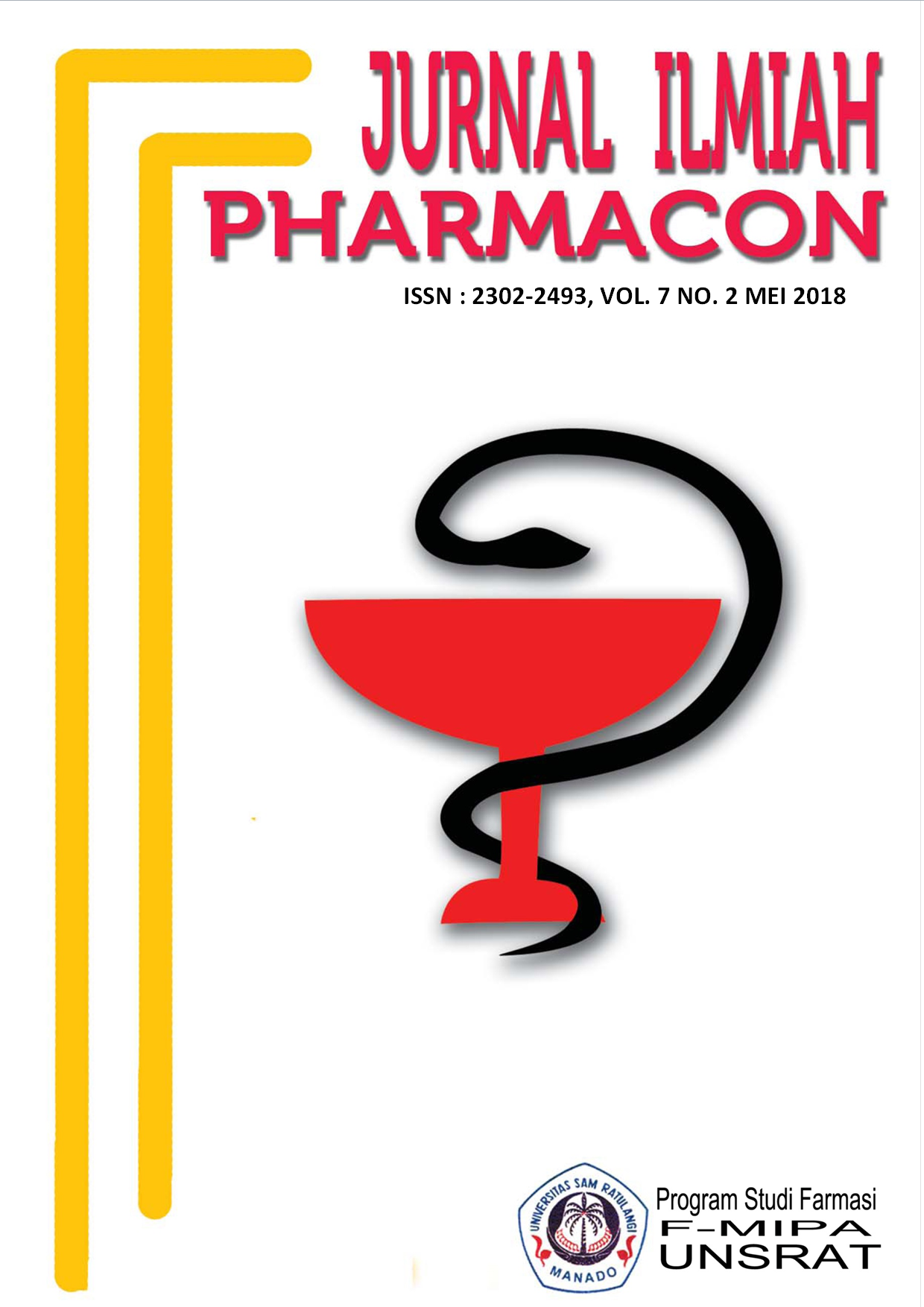ISOLASI DAN IDENTIFIKASI SECARA BIOMOLEKULER BAKTERI PENYEBAB PENYAKIT INFEKSI SALURAN KEMIH YANG RESISTEN TERHADAP ANTIBIOTIK CIPROFLOXACIN DI RSUP PROF.DR.R.D.KANDOU MANADO
DOI:
https://doi.org/10.35799/pha.7.2018.19511Abstract
ISOLASI DAN IDENTIFIKASI SECARA BIOMOLEKULER BAKTERI PENYEBAB PENYAKIT INFEKSI SALURAN KEMIH YANG RESISTEN TERHADAP ANTIBIOTIK CIPROFLOXACIN DI RSUPÂ PROF.DR.R.D.KANDOU MANADOChristin M. Sikome 1) , Fatimawali 1) , Trina E. Tallei 2)
1) Program Studi Farmasi FMIPA UNSRAT Manado, 95115
2) Jurusan Biologi Farmasi FMIPA UNSRAT , 95115
Â
ABSTRACT
Â
Urinary tract infection (UTI) is the second most common type of infection in the human body. Treatment of infectious disease generally use antibiotics, the most antibiotics used for treatment of UTI was the flouroquinolon. The irrationality of antibitics use will lead to emergence of many side effects and bacterial resistance. This study aims to test the resistance and identify bacteria isolated from the urine of individuals with UTI with ciprofloxacin antibiotics. This research is explorative descriptive. The urine sample was taken from the midstream urine of five participants who were willing and indicated with urinary tract infection (UTI) diseases, which had been or in process using ciprofloxacin antibiotics underwent inpatient at Prof. Dr. R. D. Kandou Hospital. Bacterial isolates obtained were tested for resistance against ciprofloxacin antibiotics. The resistance result with 17 isolates showed ciprofloxacin had a 47.06% and a sensitive percentage of 52.94%. One isolate of bacteria with high resitance levels was identified biomolecularly using a 16S rRNA gene and identified as Klebsiella pneumonia bacteria.
Â
Keywords: Urinary tract infections, urine, antibiotic resistant bacteria,ciprofloxacin, 16S rRNA gene.
Â
ABSTRAKÂ
Infeksi saluran kemih (ISK) merupakan jenis infeksi kedua yang paling umum terjadi di dalam tubuh. Pengobatan penyakit infeksi umumnya menggunakan antibiotik, Antibiotik yang digunakan untuk pengobatan ISK sebagian besar yakni fluoroquinolon. Ketidakrasionalan penggunaan antibiotik akan menyebabkan munculnya banyak efek samping dan resistensi bakteri. Penelitian ini bertujuan untuk menguji resistensi dan mengidentifikasi bakteri yang diisolasi dari urin individu penderita ISK dengan antibiotik ciprofloxacin. Penelitian ini bersifat deskriptif eksploratif. Sampel urin diambil dari urin porsi tengah (midstream urine) lima partisipan yang bersedia dan terindikasi penyakit Infeksi Saluran Kemih (ISK) yang telah atau sementara menggunakan antibiotik ciprofloxacin yang menjalani rawat inap di RSUP Prof. Dr. R. D. Kandou. Isolat bakteri yang diperoleh dilakukan uji resistensi terhadap antibiotik ciprofloxacin. Hasil Uji resistensi dengan 17 isolat menunjukan ciprofloxacin memiliki persentase resisten 47,06 % dan sensitif sebesar 52,94 %. Satu isolat bakteri dengan tingkat resistensi yang tinggi diidentifikasi secara biomolekuler menggunakan gen 16S rRNA dan teridentifikasi sebagai bakteri Klebsiella pneumoniae.
Kata kunci : Infeksi saluran kemih, urin, bakteri resisten antibiotik, ciprofloxacin, Â Â Â Â Â Â Â Â Â Â Â Â Â Â Â Â Â Â Â Â Â Â Â Â Â Â Â Â Â Â Â Â Â Â Â gen 16S rRNA.
Â
Â
Â
Â
Downloads
Published
How to Cite
Issue
Section
License
Authors who publish with this journal agree to the following terms:
- Authors retain copyright and grant the journal right of first publication with the work simultaneously licensed under a Creative Commons Attribution-NonCommercial 4.0 International License that allows others to share the work with an acknowledgement of the work's authorship and initial publication in this journal.
- Authors are permitted and encouraged to post their work online (e.g., in institutional repositories or on their website) prior to and during the submission process, as it can lead to productive exchanges, as well as earlier and greater citation of published work (See The Effect of Open Access)










